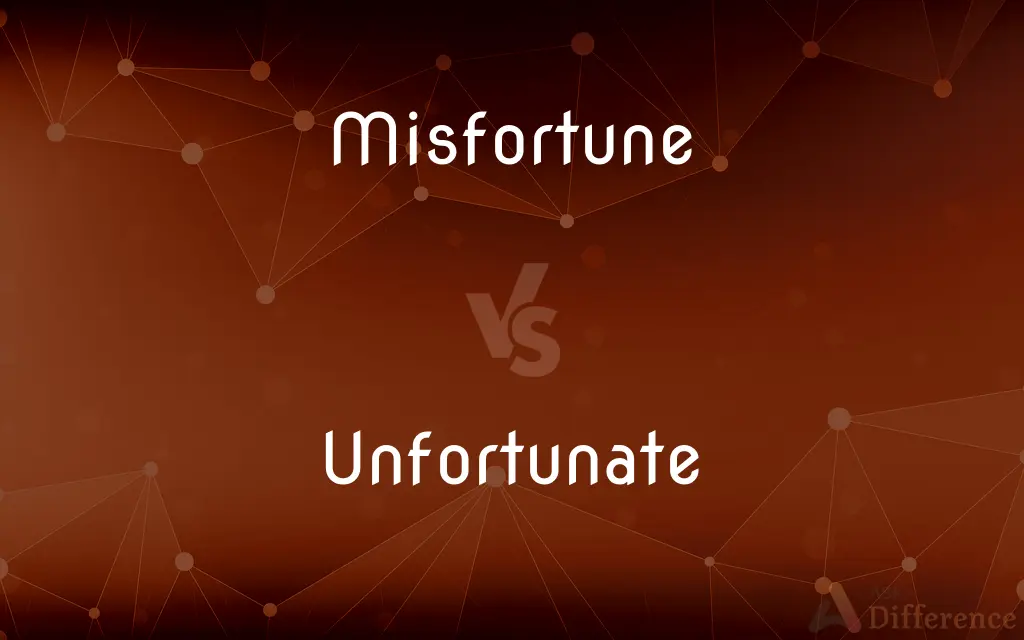Misfortune vs. Unfortunate — What's the Difference?
Edited by Tayyaba Rehman — By Maham Liaqat — Updated on March 8, 2024
Misfortune refers to an unfortunate condition or event, emphasizing the outcome, while unfortunate describes conditions or qualities, focusing on the nature or state of being unlucky.

Difference Between Misfortune and Unfortunate
Table of Contents
ADVERTISEMENT
Key Differences
Misfortune is typically used to describe an event or series of events that lead to adverse outcomes, such as accidents, natural disasters, or personal losses. It highlights the aspect of suffering or hardship that occurs without one's control. On the other hand, unfortunate is often used as an adjective to describe situations, decisions, or characteristics laden with bad luck or unfavorable circumstances, emphasizing the quality rather than the event itself.
While misfortune implies a more passive experience, something that befalls someone without their intention or fault, unfortunate can also suggest a lack of wisdom or foresight that contributes to a negative outcome. For example, venturing unprepared into a storm might be considered an unfortunate decision leading to the misfortune of being stranded.
Misfortune carries a sense of scale or impact, often associated with significant emotional or physical distress. It is used in contexts where the gravity of the situation is apparent and sympathy is evoked. Conversely, unfortunate can be used in both serious and minor contexts, from an unfortunate accident to an unfortunate choice of words, allowing for a broader range of application.
Misfortune is often seen as something to be endured or overcome, suggesting a narrative of resilience and the possibility of future recovery. Unfortunate, however, can imply a more immediate judgment or assessment of a situation or action, focusing on the present state without necessarily considering the longer trajectory.
Despite their differences, both terms serve to communicate the presence of difficulty or adversity in the human experience. They are used to elicit empathy, understanding, or caution, depending on the context, and reflect the nuanced ways in which language captures the varied shades of luck and misadventure.
ADVERTISEMENT
Comparison Chart
Part of Speech
Noun (Misfortune)
Adjective (Unfortunate)
Usage
Describes an event or condition
Describes a condition, decision, or characteristic
Connotation
Emphasizes the outcome or impact
Focuses on the nature or state of being
Context
Often used for more significant adversities
Can be used for both minor and major adversities
Implication
Suggests endurance or overcoming
May imply lack of wisdom or immediate judgment
Compare with Definitions
Misfortune
The bad luck or hardship someone experiences.
He bore his misfortune with remarkable stoicism.
Unfortunate
Marked by or full of bad luck.
It was an unfortunate accident that could have been avoided.
Misfortune
A condition marked by adverse circumstances or events.
The family faced misfortune after their home was destroyed by a fire.
Unfortunate
Regrettable or disappointing.
It’s unfortunate that we missed the beginning of the concert.
Misfortune
A series of unfortunate events.
A series of misfortunes led them to reconsider their plans.
Unfortunate
Not favorable or unlucky.
He made an unfortunate investment that cost him his savings.
Misfortune
An unlucky incident; a mishap.
The expedition was fraught with misfortune from the start.
Unfortunate
Poor in quality or condition.
The meal was unfortunate, not living up to their expectations.
Misfortune
An outcome of bad luck.
Misfortune seemed to follow her, no matter where she went.
Unfortunate
Inauspicious or ill-omened.
Their meeting proved to be an unfortunate omen for the project.
Misfortune
Bad luck
The project was dogged by misfortune
Unfortunate
Having or marked by bad fortune; unlucky
There'd been an unfortunate accident
Misfortune
Bad fortune or ill luck.
Unfortunate
Regrettable or inappropriate
His unfortunate remark silenced the gathering
Misfortune
The condition resulting from bad fortune or ill luck
Wanted to help those in misfortune.
Unfortunate
A person who suffers bad fortune
Those unfortunates whose lives are marred by poverty
Misfortune
A distressing occurrence
"Misfortunes are too apt to wear out Friendship" (Charlotte Charke).
Unfortunate
A person who is considered immoral or lacking in religious faith or instruction, especially a prostitute.
Misfortune
(uncountable) Bad luck.
The worst tour I have ever had the misfortune to experience.
Unfortunate
Having bad luck; unlucky.
Misfortune
(countable) An undesirable event such as an accident.
She had to come to terms with a number of misfortunes.
Unfortunate
Characterized by, bringing, or causing misfortune
An unfortunate turn of events.
Misfortune
Bad fortune or luck; calamity; an evil accident; disaster; mishap; mischance.
Consider why the change was wrought,You 'll find his misfortune, not his fault.
Unfortunate
Regrettable; deplorable
An unfortunate lack of good manners.
Misfortune
To happen unluckily or unfortunately; to miscarry; to fail.
Unfortunate
A victim of bad luck.
Misfortune
Unnecessary and unforeseen trouble resulting from an unfortunate event
Unfortunate
Not favored by fortune
Misfortune
An unfortunate state resulting from unfavorable outcomes
Unfortunate
Marked or accompanied by or resulting in misfortune
Unfortunate
An unlucky person; one who has fallen into bad circumstances.
Unfortunate
A prostitute.
Unfortunate
Not fortunate; unsuccessful; not prosperous; unlucky; attended with misfortune; unhappy; as, an unfortunate adventure; an unfortunate man; an unfortunate commander; unfortunate business.
Unfortunate
A person who suffers misfortune
Unfortunate
Not favored by fortune; marked or accompanied by or resulting in ill fortune;
An unfortunate turn of events
An unfortunate decision
Unfortunate investments
An unfortunate night for all concerned
Unfortunate
Not auspicious; boding ill
Unfortunate
Unsuitable or regrettable;
An unfortunate choice of words
An unfortunate speech
Common Curiosities
How does one cope with misfortune?
Coping with misfortune typically involves resilience, seeking support, and finding ways to overcome or adapt to adverse circumstances.
Can misfortune be avoided?
Misfortune often occurs without one's control and may not always be avoidable.
What does unfortunate mean?
Unfortunate describes conditions, decisions, or characteristics that are marked by bad luck or are unfavorable.
Can something be unfortunate but not a misfortune?
Yes, minor or less significant negative outcomes can be unfortunate without rising to the level of a misfortune.
Does misfortune imply fault or blame?
Misfortune generally does not imply fault or blame, as it focuses on adverse events happening beyond one's control.
Do cultures view misfortune differently?
Yes, cultural perspectives on misfortune and how it is interpreted or dealt with can vary significantly.
Is being unfortunate the same as being unlucky?
Yes, being unfortunate is essentially synonymous with being unlucky, as both imply adverse circumstances or outcomes.
Is misfortune always serious?
Misfortune often carries a serious connotation, especially when it leads to significant distress or loss.
What is misfortune?
Misfortune is an adverse condition or event resulting in suffering or hardship.
Can a decision be unfortunate?
Yes, decisions can be unfortunate if they lead to negative outcomes or are made under bad circumstances.
Can someone's personality be unfortunate?
While it's less common, describing someone's personality as unfortunate might imply that it leads to negative outcomes or is not conducive to their well-being.
Is misfortune always due to external factors?
Misfortune is often due to external factors, but it can also result from personal decisions or actions.
Can technology cause misfortune?
Technology can lead to misfortune if it malfunctions or is used in a way that results in harm or adversity.
How can one describe an unfortunate event?
An unfortunate event can be described as a situation that occurred with bad luck or resulted in a negative outcome.
Is there a way to measure misfortune?
While subjective and dependent on personal perception, the impact of misfortune can be assessed in terms of emotional, physical, and financial loss.
Share Your Discovery

Previous Comparison
Ventriloquism vs. Ventriloquy
Next Comparison
Millet vs. MiloAuthor Spotlight
Written by
Maham LiaqatEdited by
Tayyaba RehmanTayyaba Rehman is a distinguished writer, currently serving as a primary contributor to askdifference.com. As a researcher in semantics and etymology, Tayyaba's passion for the complexity of languages and their distinctions has found a perfect home on the platform. Tayyaba delves into the intricacies of language, distinguishing between commonly confused words and phrases, thereby providing clarity for readers worldwide.














































